Just like opossums and raccoons, skunks are burrowing animals. Are there differences in the holes that they make? You may consider the idea of asking for help from professionals to confirm a skunk hole. Nonetheless, you can learn how to identify it by yourself.
So, how big is a skunk hole? They’re shallow as they’re only three inches deep with a diameter of three to five inches. These sizes are as big as its nose that is being pressed down when digging with its claws. It is made to hunt grubs and worms, which are usually found in the garden or lawn.
By reading the entire article, you will learn more about where skunks dig holes, how you can find them, and how to prevent these holes from surfacing. Let’s begin!
Where Do Skunks Hide During the Day?
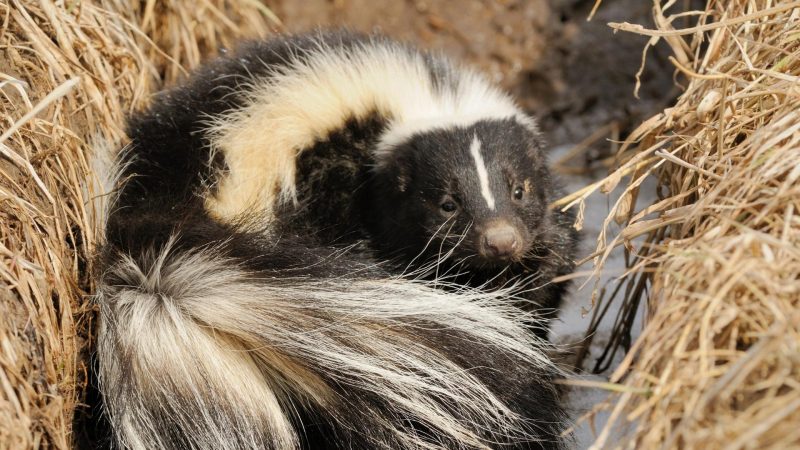
As nocturnal animals, skunks hide during the day in the following places:
- Under stumps
- Stone walls
- Under decks
- Under sheds
- In garages
- Below home’s additions
- In crawl spaces
- Stacked wood piles
- Tall grass
- Dried drainage culvert pipes
How Big of a Hole Does a Skunk Need?
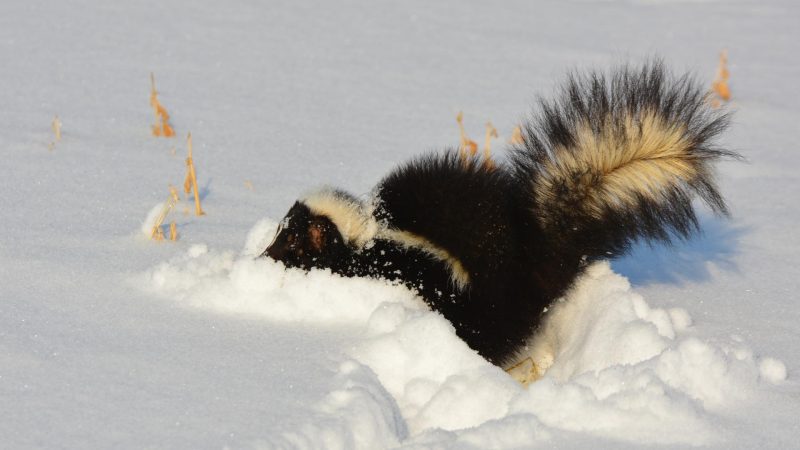
The entrance hole of the burrow should be 8 inches wide to allow a skunk to get inside. You may think that it’s quite small, but it goes down deep, and you won’t even see its nest.
How Small a Hole Can a Skunk Fit Through?
Skunks can squeeze themselves into a small hole that is not bigger than what a huge rat can fit through. Furthermore, the smallest hole that it can enter has a diameter of four inches.
How Do You Find a Skunk Den?
There are two ways of finding a skunk den. First, you have to be attentive to the size and location. As mentioned, they make an entrance hole that is eight inches wide. It goes down deep, so you won’t likely see its nest.
Second, skunks dig their holes under an object that provides protection. For instance, the den can be found on a fallen log or an enormous rock. Skunks can also dig under patios and decks. You also have to know that skunks leave some hair on the den’s entrance.
Do Skunks Burrow Holes in the Ground?
Yes, skunks are known as notorious diggers and will dig up holes in the ground. They usually do so overnight as these animals forage at night. Skunks are known to dig up golf courses, lawns, and other sodded areas for earthworms and white grubs.
Does a Skunk Den Smell?
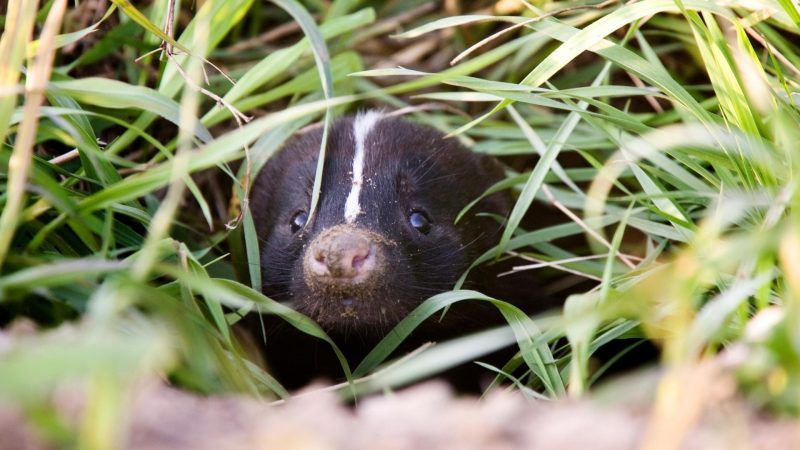
A skunk den smells because it sprays the renowned foul odor coming from its anal glands to repel any threat. It’s a nauseating odor that can linger for several days.
Do Skunks Burrow Under Houses?
Skunks can burrow in dens, porches, and house’s addition or shed. If you have crawl spaces underneath your home, there’s a big change that skunks will infiltrate them.
Do Skunks Stay in One Place?
Skunks stay in one place when offspring are born in late winter. In addition, it’s common for some of them to share a den during winter when they’re in a torpor state. During this period, they sleep most of the time but step out as well to look for food.
The babies become independent in summer. So, they leave their dens and separate themselves from their family. They can go as far as 1.5 miles from their dens to find grubs and other kinds of food. But they mostly prefer staying in areas near their dens.
When a skunk lives by itself, it transfers from a den to another every few days or more in the early spring until late fall season. By wintertime, it will occupy a different den.
Will Skunks Leave On Their Own?
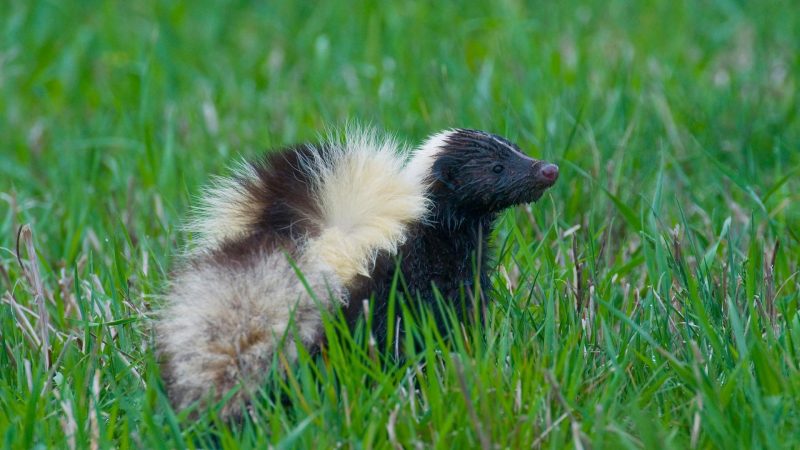
Skunks will likely leave a place if predators are bothering them and when food is scarce. When offspring become old enough to be on their own, they will leave voluntarily. After the long winter, skunks leave on their own to look for food and replenish the calories that they lost.
Do Skunks Leave Their Den Every Night?
Skunks can leave their den every night because they’re nocturnal. Except for the cold season, they go out at night to hunt for food. When the breeding season comes from February to March, male skunks will travel every night until they find a mating partner.
What Attracts Skunks in Your Yard?
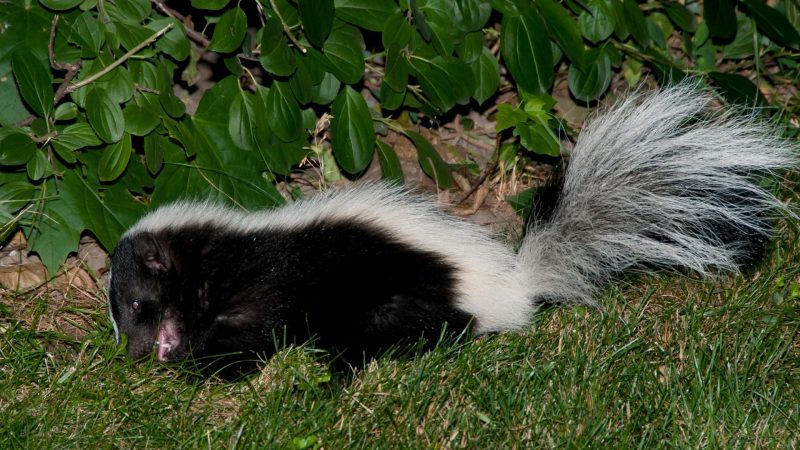
1. Food Source
Skunks consume both plants and animals. It depends on the availability which can be offered in your yard. They usually feed on earthworms, grubs, and insects.
Therefore, they dig holes in your lawn as their favorites can be found under the ground. When an infestation of grubs happens in your yard, skunks will be excited to enter it. Hence, grubs are to blame when you see skunks’ holes.
Additionally, skunks also scavenge on garbage and carrions in urban and suburban areas. So, they infiltrate areas where garbage is stationed. Pet food is another thing that attracts them. Thus, you have to ensure that these things won’t be easily accessed by skunks.
2. For Shelter
Skunks enter your yard because of the potential areas for creating a den. The ideal place for them is patios, decks, and sheds. It’s best to block the entrance to these places.
- Predator urine. Skunks don’t like to be near predators such as coyotes and dogs. Spray predator urine or scatter flakes that are dipped in it in your yard’s perimeter. You can buy them from a garden store.
- Getting rid of grubs. Grubs attract skunks, so it’s wise to remove them in your yard. During early spring and late summer, you can get nematodes to get rid of them quickly.
- Securing trash bins. Make sure that the lid of the trash bins is tightly closed or even locked.
Are Skunks Bad for Your Yard?
Skunks can leave a mess from digging, like pushing down your plants and flowers. Although their food hunting can destroy the appearance of your yard or garden, there’s a good side.
When skunks dig, they improve aeration and dirt drainage, which promote air circulation in the soil. They also help with saturating excess water in the ground.
How Do You Keep Skunks Out of Your Yard?
Here are the things that you can use to keep skunks out of your yard:
- Sensor lights. Since skunks are nocturnal, they will be startled by bright lights. A does the job well.
- Strong scent. Skunks hate strong scents so you can , citrus, and soap. and are also effective solutions. Spread any of these options around your yard to ward off skunks and even other destructive wildlife.
- Scarecrow. Humans are a threat to skunks. So, take this opportunity by erecting a mechanical scarecrow. You may also use human-like structures like a bird or owl scarecrows.
List of Sources
Brantley, P. (2016). Return of the…Skunk.
Mesmer, T. (2017). Ask an Expert: What Is Digging up My Yard? The Nose Knows!
Thurston, S. N., Brittingham, M. C. (2006). Skunks – Solutions to Common Problems.
Voyle, G. (2013). Who’s that digging in my yard: Skunks, raccoons or moles?
- How to Get Rid of Copperheads | Practical Guide - August 27, 2023
- How to Get Rid of Corn Snakes | What Makes Them Aggressive? - August 27, 2023
- How to Get Rid of Alligators | Safety Measures and Removal Methods - July 16, 2023

